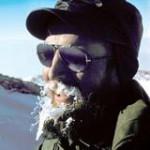Tag Physics
UW-Madison student wins $250,000 fellowship
Daniel Lecoanet, who will graduate with comprehensive honors from University of Wisconsin–Madison this spring with a double major in math and physics, has won a five-year, no-strings-attached fellowship to pursue graduate studies.
Particle accelerator ready to attempt record-breaking collisions
Energy is building at the Large Hadron Collider outside of Geneva, Switzerland, in more ways than one.
UW-Madison physicists build basic quantum computing circuit
Exerting delicate control over a pair of atoms within a mere seven-millionths-of-a-second window of opportunity, physicists at the University of Wisconsin–Madison created an atomic circuit that may help quantum computing become a reality.
IceCube’s Antarctic season ends with success
As darkness settles over the South Pole and the Antarctic winter begins, the IceCube Neutrino Observatory has something to celebrate: a great season on the ice.
UW-Madison student wins Churchill Scholarship
A student who has engaged in chemistry and mathematics research on campus since high school is the University of Wisconsin–Madison's third Churchill Scholar - and the first in 30 years.
Dental delight! Tooth of sea urchin shows formation of biominerals
Some of the most common minerals in biology, including those in bones and shells, have a mysterious structure: Their crystals are positioned in the same orientation, making them behave as one giant crystal, even though they do not look like a faceted crystal.
Giant collider back in gear, sets record for collision intensity
On Nov. 30, the world's largest scientific instrument, the Large Hadron Collider, set a record when it smashed one stream of protons against another and then accelerated the beams to 1.18 trillion electron volts, exceeding the record held by Fermilab in Illinois since 2001.
Scientists hope to mimic nature’s dynamos
In the cosmos, all celestial objects - planets, stars, galaxies and clusters of galaxies - have magnetic fields. On Earth, the magnetic field of our home planet is most easily observed in a compass where the needle points north.
Curiosities: How big is space?
Space is probably infinite, but we can see only the part that contains stars or galaxies whose light has been able to reach us, says…
UW-Madison physicist elected to National Academy of Sciences
Susan N. Coppersmith, a University of Wisconsin–Madison professor of physics, was elected to the prestigious National Academy of Sciences today (April 28), in recognition of her "distinguished and continuing achievements in original research."
IceCube building goals exceeded at South Pole
As the 2008-09 Antarctic drilling season concludes, the IceCube Neutrino Observatory is on track to be finished as planned in 2011.
Four faculty awarded prestigious Sloan Fellowships
Four members of the University of Wisconsin–Madison faculty are among 118 scientists, mathematicians and economists from around the country who have been awarded prestigious Alfred P. Sloan Research Fellowships.
Sea urchin yields a key secret of biomineralization
The teeth and bones of mammals, the protective shells of mollusks, and the needle-sharp spines of sea urchins and other marine creatures are made-from-scratch wonders of nature.
Heart of the Matter
Underground in Europe, thousands of scientists — using the largest accelerator ever built — are conducting a thrilling hunt. They’re looking for tiny particles that are the source of all matter’s mass, hoping to solve some of the biggest mysteries in physics. And UW–Madison researchers are right at the center of the action.
World’s biggest particle accelerator begins operation
After more than 15 years of planning and preparation, the Large Hadron Collider (LHC), the world's most powerful particle accelerator, started operating this morning (Sept. 10).
Curiosities: What’s behind the claims that the new particle accelerator in Europe may create black holes that could destroy the Earth? Should we be worried?
When the Large Hadron Collider starts running this summer near Geneva, Switzerland, some physicists have predicted that some of its high-energy proton collisions could…
South Pole researchers training this week at UW’s Physical Sciences Lab
This week marks the annual "Driller and Deployer Workshop" for research staff who will work at the South Pole as part of the well-known IceCube Neutrino Observatory project.
UW-Madison graduate programs fare well in annual U.S. News rankings
A number of graduate programs and specialties at UW–Madison scored high marks in the 2009 "Best Graduate Schools" edition of U.S. News and World Report.
Particle accelerator may reveal shape of alternate dimensions
When the world's most powerful particle accelerator starts up later this year, exotic new particles may offer a glimpse of the existence and shapes of extra dimensions.








